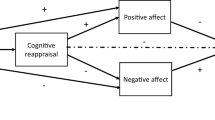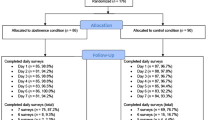Abstract
Although mindfulness has been linked with salutary clinical outcomes, less is known about its relation to cognitive mechanisms implicated in the onset and maintenance of alcohol dependence. Because trait mindfulness is associated with attentional control and emotion regulation, we hypothesized that trait mindfulness would be inversely associated with attentional bias towards visual alcohol cues. We tested this hypothesis in a sample of alcohol-dependent adults residing in a treatment facility, who completed questionnaires on trait mindfulness, craving, and stress, as well as a spatial cueing task designed to assess alcohol attentional bias. Recovering alcohol-dependent individuals high in trait mindfulness exhibited less alcohol attentional bias (AB), stress, and craving, and greater alcohol-related self-efficacy, than their counterparts low in trait mindfulness. Multiple linear regression analyses indicated that trait mindfulness was more predictive of alcohol AB than stress, craving, alcohol-related self-efficacy, time in treatment, or pre-treatment level of alcohol consumption. Identification of malleable traits that can offset automatic cognitive mechanisms implicated in addiction may prove to be crucial to treatment development efforts.
Similar content being viewed by others
References
Baer, R. A., Smith, G. T., Hopkins, J., Krietemeyer, J., & Toney, L. (2006). Using self-report assessment methods to explore facets of mindfulness. Assessment, 13(1), 27–45.
Bowen, S., Witkiewitz, K., Dillworth, T. M., Chawla, N., Simpson, T. L., Ostafin, B. D., et al. (2006). Mindfulness meditation and substance use in an incarcerated population. Psychology of Addictive Behaviors, 20(3), 343–347.
Bowen, S., Witkiewitz, K., Dillworth, T. M., & Marlatt, G. A. (2007). The role of thought suppression in the relationship between mindfulness meditation and alcohol use. Addictive Behaviors, 32(10), 2324–2328.
Breslin, F. C., Sobell, L. C., Sobell, M. B., & Agrawal, S. (2000). A comparison of a brief and long version of the situational confidence questionnaire. Behaviour Research and Therapy, 38, 1211–1220.
Bruner, J. S. (1957). On perceptual readiness. Psychological Review, 64, 123–152.
Carmody, J., & Baer, R. A. (2008). Relationships between mindfulness practice and levels of mindfulness, medical and psychological symptoms and well-being in a mindfulness-based stress reduction program. Journal of Behavior Medicine, 31(1), 23–33.
Carrasco, M. (2006). Covert attention increases contrast sensitivity: Psychophysical, neurophysiological, and neuroimaging studies. In S. Martinez-Conde, S. L. Macknik, L. M. Martinez, J. M. Alonso & T. U. Tse (Eds.), Progress in Brain Research (Vol. 154). doi:10.1016/S0079-6123(06)54003-8.
Chambers, R., Gullone, E., & Allen, N. B. (2009). Mindful emotion regulation: An integrative review. Clinical Psychology Review, 29(6), 560–572.
Cohen, S., Kamarck, T., & Mermelstein, R. (1983). A global measure of perceived stress. Journal of Health and Social Behavior, 24(4), 385–396.
Corbetta, M., & Shulman, G. L. (2002). Control of goal-directed and stimulus-driven attention in the brain. Nature Reviews Neuroscience, 3, 201–215.
Desimone, R., & Duncan, J. (1995). Neural mechanisms of selective visual attention. Annual Review of Neuroscience, 18, 193–222.
Duncan, J., Ward, R., & Shapiro, K. (1994). Direct measurement of attentional dwell time in human vision. Nature, 369, 313–315.
Field, M. (2006). Attentional biases in drug abuse and addiction: Cognitive mechanisms, causes, consequences, and implications. In M. Munafo & I. Albery (Eds.), Cognition and addiction (pp. 73–99). New York: Oxford University Press.
Field, M., & Cox, W. M. (2008). Attentional bias in addictive behaviors: a review of its development, causes, and consequences. Drug and Alcohol Dependence, 97(1–2), 1–20.
Field, M., & Eastwood, B. (2005). Experimental manipulation of attentional bias increases the motivation to drink alcohol. Psychopharmacology (Berl), 183(3), 350–357.
Field, M., Mogg, K., Zetteler, J., & Bradley, B. P. (2004). Attentional biases for alcohol cues in heavy and light social drinkers: the roles of initial orienting and maintained attention. Psychopharmacology (Berl), 176(1), 88–93.
Field, M., Munafo, M., & Franken, I. (2009). A meta-analytic investigation of the relationship between attentional bias and subjective craving in substance abuse. Psychological Bulletin, 135, 589–607.
Field, M., & Powell, H. (2007). Stress increases attentional bias for alcohol cues in social drinkers who drink to cope. Alcohol and Alcoholism, 42(6), 560–566.
Flannery, B. A., Volpicelli, J. R., & Pettinati, H. M. (1999). Psychometric properties of the Penn alcohol craving scale. Alcoholism, Clinical and Experimental Research, 23(8), 1289–1295.
Garland, E. L. (2007). The meaning of mindfulness: A second-order cybernetics of stress, metacognition, and coping. Complementary Health Practice Review, 12(1), 15–30.
Garland, E. L., Boettiger, C. A., & Howard, M. O. (2011). Targeting cognitive-affective risk mechanisms in stress-precipitated alcohol dependence: An integrated, biopsychosocial model of allostasis, automaticity, and addiction. Medical Hypotheses, 76, 745–754.
Garland, E. L., Gaylord, S. A., Boettiger, C. A., & Howard, M. O. (2010). Mindfulness training modifies cognitive, affective, and physiological mechanisms implicated in alcohol dependence: Results from a randomized controlled pilot trial. Journal of Psychoactive Drugs, 42(2), 177–192.
Herndon, F. (2008). Testing mindfulness with perceptual and cognitive factors: External vs. internal encoding, and the cognitive failures questionnaire. Personality and Individual Differences, 44(1), 32–41.
Hopfinger, J. B., & Maxwell, J. S. (2005). Appearing and disappearing stimuli trigger a reflexive modulation of visual cortical activity. Cognitive Brain Research, 25, 48–56.
Jha, A., Krompinger, J., & Baime, M. (2007). Mindfulness training modifies subsystems of attention. Cognitive, Affective and Behavioral Neuroscience, 7(2), 109–119.
Loas, G., Fremaux, D., Otmani, O., Lecercle, C., & Delahousse, J. (1997). Is alexithymia a negative factor for maintaining abstinence? A follow up study. Comprehensive Psychiatry, 38(5), 296–299.
Ludwig, D. S., & Kabat-Zinn, J. (2008). Mindfulness in medicine. JAMA, 300(11), 1350–1352.
Lutz, A., Slagter, H. A., Dunne, J. D., & Davidson, R. J. (2008). Attention regulation and monitoring in meditation. Trends in Cognitive Sciences, 12(4), 163–169.
Monti, P. M., Abrams, D. B., Kadden, R. M., & Cooney, N. L. (1989). Treating alcohol dependence: A coping skills training guide. New York: Guilford.
Moore, A., & Malinowski, P. (2009). Meditation, mindfulness, and cognitive flexibility. Consciousness and Cognition, 18, 176–186.
Noel, X., Colmant, Van., Der Linden, M., Bechara, A., Bullens, Q., Hanak, C., et al. (2006). Time course of attention for alcohol cues in abstinent alcohol patients: The role of initial orienting. Alcoholism, Clinical and Experimental Research, 30(11), 1871–1877.
Ostafin, B. D., & Marlatt, G. A. (2008). Surfing the urge: Experiential acceptance moderates the relation between automatic alcohol motivation and hazardous drinking. Journal of Social and Clinical Psychology, 27, 404–418.
Posner, M. I., & Rothbart, M. K. (1998). Attention, self-regulation, and consciousness. Philosophical Transactions of the Royal Society of London B: Biological Sciences, 353, 1915–1927.
Sayette, M., Reichle, E. D., & Schooler, J. W. (2009). Lost in the sauce: The effects of alcohol on mind wandering. Psychological Science, 20(6), 747–752.
Schmertz, S. K., Anderson, P. L., & Robins, D. L. (2009). The relation between self-report mindfulness and performance on tasks of sustained attention. Journal of Psychopathology and Behavioral Assessment, 31, 60–66.
Sheehan, D. V., Lecrubier, Y., Sheehan, H., Amorim, P., Janavs, J., Weiller, E., et al. (1998). The mini-international neuropsychiatric interview (M.I.N.I.): The development and validation of a structured diagnostic psychiatric intervention for DSM-IV and ICD-10. Journal of Clinical Psychiatry, 59, 22–33.
Slagter, H. A., Lutz, A., Greischar, L. L., Francis, A. D., Nieuwenhuis, S., Davis, J. M., et al. (2007). Mental training affects distribution of limited brain resources. PLoS Biology, 5(6), e138.
Soto, D., Hodsoll, J., Rotshtein, P., & Humphreys, G. W. (2008). Automatic guidance of attention from working memory. Trends in Cognitive Sciences, 12, 342–348.
Stormark, K. M., Field, N. P., Hugdahl, K., & Horowitz, M. (1997). Selective processing of visual alcohol cues in abstinent alcoholics: An approach-avoidance conflict? Addictive Behaviors, 22(4), 509–519.
Tang, Y. Y., Ma, Y., Wang, J., Fan, Y., Feng, S., Lu, Q., et al. (2007). Short-term meditation training improves attention and self-regulation. Proceedings of the National Academy of Sciences USA, 104(43), 17152–17156.
Theeuwes, J. (1991). Exogenous and endogenous control of attention: The effect of visual onsets and offsets. Perception & Psychophysics, 49, 83–90.
Theeuwes, J. (2005). Irrelevant singletons capture attention. In L. Itti, G. Rees, & J. K. Tsotsos (Eds.), Neurobiology of attention (pp. 418–424). London: Elsevier Academic Press.
Tiffany, S. T. (1990). A cognitive model of drug urges and drug-use behavior: Role of automatic and nonautomatic processes. Psychological Review, 97(2), 147–168.
Townshend, J. M., & Duka, T. (2007). Avoidance of alcohol-related stimuli in alcohol-dependent inpatients. Alcoholism, Clinical and Experimental Research, 31(8), 1349–1357.
Wiers, R. W., Houben, K., Smulders, F. T., Conrod, P. J., & Jones, B. T. (2006). To drink or not to drink: The role of automatic and controlled cognitive processes in the etiology of alcohol-related problems. In R. W. Wiers & A. W. Stacy (Eds.), Handbook of implicit cognition and addiction (pp. 339–362). Sage: New York.
Zeidan, F., Johnson, S. K., Diamond, B. J., David, Z., & Goolkasian, P. (2010). Mindfulness meditation improves cognition: Evidence of brief mental training. Consciousness and Cognition, 19(2), 597–605.
Acknowledgments
ELG was supported by Grant Number T32AT003378 from the National Center for Complementary and Alternative Medicine, a Francisco J. Varela Research Grant from the Mind and Life Institute, and an Armfield-Reeves Innovation Grant from the UNC-Chapel Hill School of Social Work. CAB was supported by Award Number KL2RR025746 from the National Center for Research Resources. VWC was supported by Grant Number F32DA025442 from the National Institute on Drug Abuse. The contents of this publication are solely the responsibility of the authors and do not necessarily represent the official views of the National Institutes of Health. The authors acknowledge the expert technical assistance of Laura Andrews.
Author information
Authors and Affiliations
Corresponding author
Rights and permissions
About this article
Cite this article
Garland, E.L., Boettiger, C.A., Gaylord, S. et al. Mindfulness is Inversely Associated with Alcohol Attentional Bias Among Recovering Alcohol-Dependent Adults. Cogn Ther Res 36, 441–450 (2012). https://doi.org/10.1007/s10608-011-9378-7
Published:
Issue Date:
DOI: https://doi.org/10.1007/s10608-011-9378-7




